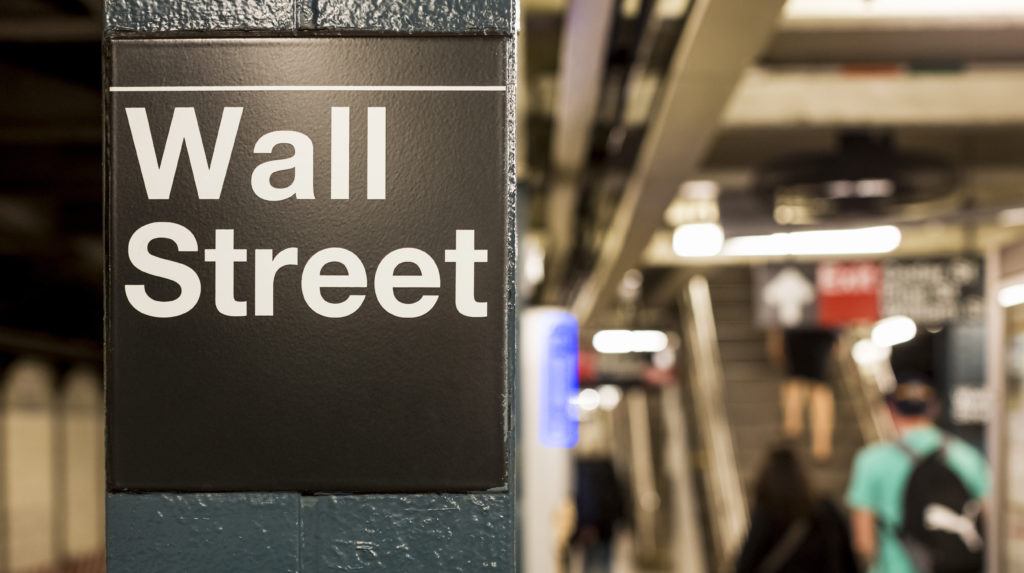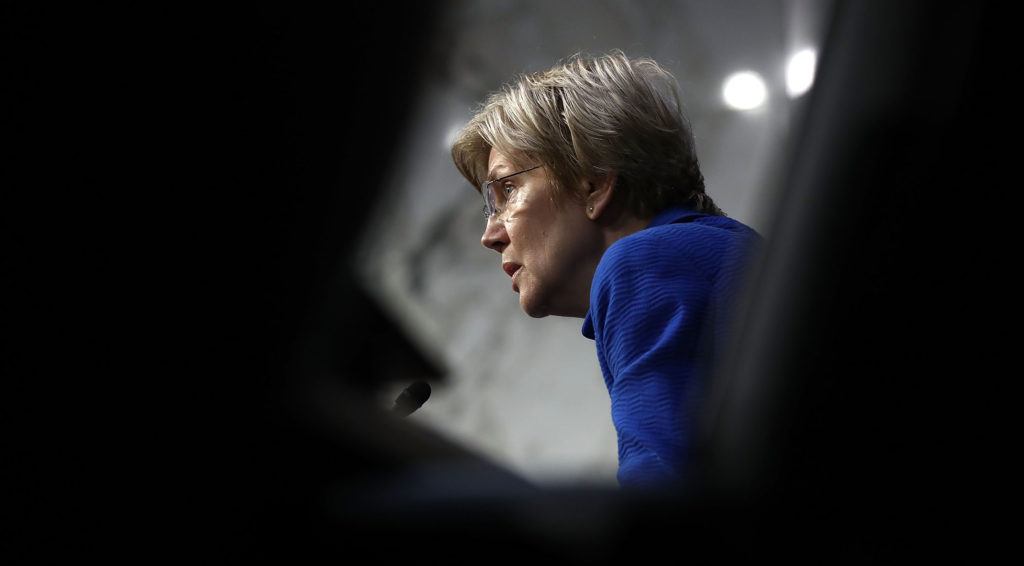
I listened with interest to the recent UnHerd interview with Niall Ferguson, conducted by my colleague Juliet Samuel. The interview dealt mainly with the causes of and fall out from the global financial crisis, ten years on.
I found myself nodding in agreement with Ferguson on most key questions. We are both, after all, broadly in favour of free markets, lean government and business-friendly tax rates.
Ferguson is right to argue that the financial collapse of a decade ago was caused less by under-regulation of banking sectors in the US, UK and beyond than by over-regulation. ‘The story that it was all the fault of deregulated markets is a fairy-tale,’ he argues.
Ferguson is similarly correct, unfortunately, when he warns that the Western world’s too-big-to-fail banks remain as dangerous as ever they were. ‘I don’t think that the financial system is significantly more stable that it was ten years ago, despite all the new regulation’, he says.
In one important respect, though, I felt Ferguson pulled his punches in this interview, as he has done in the past. For there is a banking sector regulation that is so effective that it removes the need for hundreds, even thousands of others. Moreover, it’s a regulation that is vital, as the historic record shows, when it comes to guarding against another financial crisis. Yet it remains absent in the policy armoury, in every part of the Western world – and, regrettably, Ferguson has consistently argued against it.
Among the world’s best-known and most prolific non-fiction authors, Ferguson specialises in economic history – in particular, the nexus between economics, finance and politics. He has – thanks to copious talent and a legendary work ethic – carved out a glittering career.
As well as academic posts at Harvard, Stanford and Oxford, Scottish-born Ferguson is also a leading columnist, TV presenter and public intellectual. On top of all that, he has somehow found time to become the authorised biographer of Henry Kissinger – surely the most important US diplomat of modern times.
When asked by UnHerd about the much-discussed ‘crisis of capitalism’, Ferguson reframes the question:
“Capitalism worldwide is doing pretty well and there is no coherent ideologically alternative. The real worry today is that socialism is making a comeback, even though we thought we had killed it off in around 1989.”
While capitalism has its faults, it has indeed lifted billions of people out of poverty over recent decades, not least since the fall of the Berlin Wall. In 1990, almost two-fifths of the global population lived in extreme poverty. Today, that figure is down to 10% of a far more populous world – as capitalism, in various guises, has spread across China, the former Soviet economies and much of the developing world.
The problem is, of course, that here in the Western world, the slow growth of incomes over the last ten years, coupled with inflated out-of-reach property prices, has led to widespread disillusion. ‘Within the developed countries, there is still a very significant social and political hangover from the financial crisis of 2008,’ Ferguson says. ‘And for younger voters, in particular, whose economic education began just a decade ago, it is pretty easy to blame that hangover on capitalism’.
Former US Treasury Secretary Larry Summers has argued that since the financial crisis, the Western world has suffering from ‘secular stagnation’ – in other words, an endemic lack of demand. Ferguson isn’t convinced by such neo-Keynesian thinking, and the related calls for endless policy stimulus:
‘I remain sceptical of the secular stagnation thesis,’ he says, ‘the claim we are in some kind of permanent low-growth, low interest rate, low-inflation plateau’.
Growth will pick up, Ferguson argues, if Western governments improve the ‘supply side’, lowering taxes and regulation, allowing enterprise to flourish. ‘Bad government policy is a factor in the relatively poor performance we’ve seen since the global financial crisis,’ he says.
I’m broadly with Ferguson, sharing his long-standing concerns about the Western world’s on-going reliance on spiraling government debt and quantitative easing – a state of affairs the ‘secular stagnation’ thesis advanced by Summers has been used to justify. I also very much agree with Ferguson’s analysis that the 2008 financial crisis came about because ‘of the cosy relationship between government and Wall Street and the City of London – with governments allowing the big banks to assume they’d be bailed out in a crisis’.
Where we part company is on the question of how to limit the chances of yet another debilitating financial meltdown, a collapse that would cause yet more economic fallout, further damaging the reputation of capitalism.
‘The financial crisis began in the parts of the economy that were most heavily regulated,’ says Ferguson. ‘Yet the more complicated the regulation, the more the large financial institutions are able to game those regulations’. As such, Ferguson argues, the raft of new, even more complex regulations we’ve seen since 2008 are also destined to fail because, once again, powerful corporations will find ways to ‘game’ – or subvert – them.
‘We are in danger of learning exactly the wrong lesson from the financial crisis,’ Ferguson declares – and I agree with him. ‘Excessively complex regulation is the disease of which it purports to be the cure’. The answer, then, is to use far more direct, straight forward and emphatic regulation – which cannot be ‘gamed’. And that brings us to Glass-Steagall.
Since before the global financial crisis, this columnist has banged the drum for the US and UK to re-impose a decisive split between commercial banks (that take deposits and lend to ordinary firms and households) and investment banks (which take big risks). Why? Because since this divide was incrementally removed in both nations during the late 1980s and 1990s, financial markets have lurched from crisis to crisis. No other single act did more to cause ‘sub-prime’ and transform it from a banking crisis into a broader fiscal and economic collapse.
Once the depression-era Glass-Steagall legislation was repealed in America in 1999, Wall Street investment banks systematically used taxpayer-backed deposits to take ultra-risky bets, knowing they’d be rescued if their bets backfired – precisely the ‘moral hazard’ problem Ferguson rails against. In so doing, US bulge-bracket bankers were competing with their City brethren, the UK having ended its ‘informal’ banking split during the 1986 ‘Big Bang’.

The re-introduction of a proper separation would prevent investment banks from betting with government-guaranteed deposits, so exposing them to the full force of the market. At a stroke, our banks would be far safer and the ‘too big to fail’ issue largely resolved. Since the 2008 crisis, though, the ‘co-mingling’ of investment and commercial banking has continued, despite new measures designed to separate trading and deposit-taking – measures repeatedly watered-down by the mighty banking lobby. Important elements of the sweeping 2010 Dodd-Frank Act have been repealed under the Obama and Trump administrations – and there are signs of more dilutions to come.
Banking reforms on both sides of the Atlantic have stopped short of separating investment and commercial banking into entirely different institutions. That would involve breaking-up some extremely powerful and well-connected mega-banks. America’s ‘Volcker Rule’ and, in particular, Britain’s ‘Vickers reforms’ have aimed to ‘ring-fence’ such activities instead, within the same institutions – which is utter folly.
‘Ring-fences tend to be permeable and if you really want to separate operations very clearly and decisively, you put them in different organisations,’ said Paul Volcker himself, a former US Central banker, before a UK Parliamentary Committee in 2012. ‘You don’t put two functions in the same organisation and say they cannot talk to each other or interact, of course you don’t – anyone with even a modicum of financial nous knows that’.
Mervyn King, too, told the same committee he ‘always thought total separation was the way to go’, making clear the banks would be able to circumvent any ring-fence if the interpretation of the separation depended on near-constant discussion between the banks and the regulators – as it would under the Vickers’ measures. ‘If the judgment turns into a negotiation there will be only one winner,’ warned Sir Mervyn, who at the time had just a few months to go as Bank of England governor. There is a ‘clear risk’, he said, that bankers would be able to ‘pull the wool’ over the eyes of watchdogs.
Of course, that is true. Everything we have seen in the City and Wall Street since before and, indeed, after the global financial crisis confirms it is true. The banks must instead be presented with a clear line in the sand, an explicit, institutional separation between retail and investment banking, that everyone can see – a line, the breaching of which is a criminal offence, resulting in custodial sentences. Only that will protect taxpayers, and the broader economy, from another banker-induced crash.

The renewal of a Glass-Steagall split is, of course, anathema to ‘hot-shot’ bankers who’ve relied on state handouts for survival and from whom politicians, in turn, receive campaign donations and cushy jobs once they’ve left office. That’s why those of us who’ve long backed Glass-Steagall have been derided by the banking lobby and their various media chums.
As a serious, independent thinker, Ferguson obviously does not fall into this category. Yet he has concluded that reinstating Glass-Steagall would be wrong. ‘I struggle to see what role the repeal of Glass-Steagall has played in the recent crisis,’ he told the Washington Post in 2008. In his 2012 BBC Reith Lectures he went further, saying it is ‘hard to think of a major event in the US crisis – beginning with the failures of Bear Stearns and Lehman Brothers – that could not equally well have happened with Glass-Steagall still in force’. This, I would suggest, confuses the issue. Yes, Lehman and Bear Stearns were pure investment banks, rather than ‘universal banks’ combining commercial and investment banking but they were pumped up on lending from, and partially owned, by taxpayer-backed universal banks, who were sharing in and exposed to the same recklessness.
And many universal banks themselves, moreover – the likes of Citigroup and JPMorgan in the US, along with RBS and HSBC in the UK – would clearly have gone under, causing financial, commercial and social havoc, had they not received multi-billion dollar bailouts.
Today, ten years on from the financial crisis, people of massive experience and expertise are openly advocating a formal Glass-Steagall separation. Two are Paul Volcker and Lord King. Two more are Sandford Weill and John Reed, the two US bankers who relentlessly pushed the Clinton Administration into repealing the split back in the late 1990s.
The former Labour City Minister, Lord Myners, argues for ‘complete separation’, as does Terry Smith, a City denizen with a deserved reputation for speaking truth to power. The late Sir Brian Pitman, probably the most successful and respected UK retail banker of the past 30 years, also backed Glass-Steagall – admitting as much in the final interview before his death (with the author, as it happens). It is deeply significant that Lord Lawson, who, as Tory Chancellor oversaw the mid-1980s ‘Big Bang’, is also a forceful Glass-Steagall supporter.
‘Investment banks should live on their wits, without the corrupting influence of a government-funded safety net,’ argues Sir Peter Hambro, scion of the old British merchant bank. ‘It’s the unlimited liability that made merchant – or investment – bankers more circumspect in the past because they put their balls on the block,’ he says:
“Most of today’s financial problems are because the investment bankers, using the balance sheets of the retail banks, don’t share the pain. They don’t lose anything – and their culture has infected retail banking. They should never have been together and now they should be split, completely”.

The Dodd-Frank legislation, the centre-piece of the US response to the 2008 financial crisis was an astonishing 849 pages long. It contained 398 new rules, many of which Congress, ground down by endless lobbying, failed to enact. The legislation was precisely what the Wall Street banking giants wanted – massive, complex, full of loopholes and eminently avoidable.
The 1933 Glass-Steagall Act, in contrast, was just 37 pages long – and most of those were concerned with the creation of what we know today as the Federal Deposit Insurance Corporation or FDIC, which guarantees the deposits of ordinary firms and households. Back then, Congress understood that commercial banking should be about making sound loans to viable businesses that create jobs and growth, underpinning economic progress. With the Wall Street crash fresh in their minds, lawmakers in the early 1930s were determined that gambling in stocks, futures and hard-to-price derivatives should never be an authorised use of taxpayer-guaranteed deposits.
This Glass-Steagall divide worked for 66 years, until Wall Street lobbyists forced its repeal in the late-1990s. It worked because it was simple – and anyone who violated its extremely clear rules faced five years in jail.
So how is Dodd-Frank working now? Well, in 2012, JP Morgan’s so-called ‘Whale Trades’ came to light. Two years after Dodd-Frank was introduced, the investment banking arm of a ‘thoroughbred’ bank had once again taken on massive exposure to complex and volatile synthetic credit derivatives using funds, JP Morgan was later forced to admit, belonging to ordinary depositors. This came to light not because of corporate reporting or prudent regulatory oversight, but because the related losses were so massive that they shook financial markets across the globe.
US Democrat Senator Elizabeth Warren has correctly recorded how the too-big-to-fail problem is as big as ever[2. Read my previous UnHerd column on Senator Warren from last month: “From Jeremy Corbyn to Bernie Sanders to Elizabeth Warren; what the Left is getting right”.]:
“Banks have been in a feeding frenzy, swallowing up smaller competitors to become more powerful and too big to fail… And today, eight years after the financial crisis, three out of the four biggest banks in America are even bigger than they were before.”
Warren was citing evidence from the Federal Reserve and FDIC, which shows the five biggest US banks are, once again, too-big-to-fail – which means the state will bailout them out and makes them liable to excessive risk-taking.
Very few Conservative politicians and thinkers, on either side of the Atlantic, have called out the post-Lehman banking reforms for the inadequate half-measures that they are. Warren, almost alone among senior legislators anywhere, is carrying the flame for necessary root-and-branch changes.

Niall Ferguson is right when he says the 2008 financial crisis was caused by over regulation. Western banks were subject to vast swathes of absurdly-complex, easily-avoidable rules before the crash, just as they are now. And Ferguson is also right that ‘all the new regulation’ has not made ‘the financial system significantly more stable that it was ten years ago’.
Yet the answer isn’t no regulation, it is smart, stream-lined, easy-to-understand regulation, measures that have a track-record of working, measures that the bulge-bracket universal banks – which remain too big-to-fail – are determined will not be introduced.
‘The finance industry has effectively captured our government,’ wrote Simon Johnson, another smart British economist who, like Ferguson, made his career in America. ‘Recovery will fail unless we break the financial oligarchy that is blocking essential reform’. A former Chief Economist of the International Monetary Fund, Johnson wrote those words in May 2009, in an extraordinarily prescient article in The Atlantic magazine, just a few months after the crash. Years later, the banking titans on Wall Street and the City are still vigorously resisting meaningful legislation.
The public is desperately hoping our politicians are regulating the big banks. The reality is the big banks are still regulating our politicians. Legislators need to get a grip, finally yanking the high-rolling gamblers from the teat of taxpayer-backed depositors, ending the related moral hazard. Until that happens, the big banks will take ever increasingly risks, as asset prices become ever more bloated – storing up a crash that could make 2008 seen tame.
Glass Steagall is no panacea. Banks must also observe clear capital requirements and leverage ratios if they are to be run prudently, and avoiding blowing up the broader economy once again. But a proper divide between investment and commercial banks is the most basic requirement, a necessary if not a sufficient condition to maximise our chances of relatively financial stability.
‘Students today have no memory of the great ideological battles of the 1980s that led to the defeat of socialism,’ said Niall Ferguson to UnHerd. ‘They are ready to lap it all up as if the 1980s never happened’.
They certainly are. And the quickest way to ensure that socialism does return would be yet another banking crisis, caused by too-big-to-fail banks again making massive bets with the savings of ordinary firms and households. And all because the heavily lobbied political class failed to reintroduce historically proven rules that have prevented such reckless behaviour in the past and could do so again.










Join the discussion
Join like minded readers that support our journalism by becoming a paid subscriber
To join the discussion in the comments, become a paid subscriber.
Join like minded readers that support our journalism, read unlimited articles and enjoy other subscriber-only benefits.
Subscribe